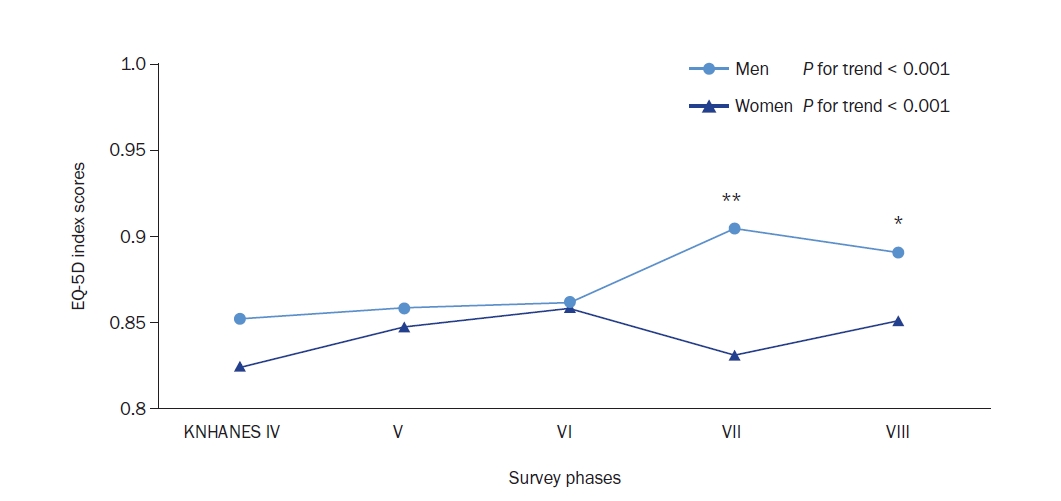- [English]
-
Sex differences in health-related quality of life among older Korean adults with type 2 diabetes mellitus: a cross-sectional study
-
Hyeonji Jeong, Kyong Park
-
Korean J Community Nutr 2024;29(4):336-347. Published online August 31, 2024
-
DOI: https://doi.org/10.5720/kjcn.2024.00003
-
-
 Abstract Abstract
 PDF PDF
- Objectives
This cross-sectional study examined sex differences in Health-Related Quality of Life (HRQoL) among seniors with Type 2 Diabetes Mellitus (T2DM).
Methods
Data from the Korea National Health and Nutrition Examination Survey (2008–2020) were analyzed. The EuroQol-5 Dimensions (EQ-5D), a measure of HRQoL, was used. It comprises five dimensions: mobility, self-care, usual activity, pain/discomfort, and anxiety/depression, each with three levels.
Results
Analysis of 3,826 older adults with T2DM showed a significant increasing trend in the EQ-5D Index from the 4th survey phase onwards (P for trend < 0.001 for both men and women). Men consistently reported higher EQ-5D levels than women across all survey years. Women’s EQ-5D levels remained lower than men’s, maintaining a decade-old disparity (P < 0.05). Men scored significantly higher (P < 0.05) in most EQ-5D domains, except for self-care and anxiety/depression, resulting in a higher total EQ-5D Index (P = 0.001). Increased comorbidities were strongly associated with lower EQ-5D levels in both sexes. Additionally, there was a negative correlation between the EQ-5D Index and refined grain intake for both sexes (P for trend < 0.001), with high-EQ-5D groups consuming fewer refined grains. Women in the high-EQ-5D group consumed more nuts, vegetables, and meat compared to men (P for trend < 0.05).
Conclusions
Our study highlights the sex disparities in HRQoL among older adults with T2DM. The findings suggest the need for tailored treatment guidelines aimed at improving the HRQoL of elderly T2DM patients, with a focus on their sex-specific characteristics. Implementing these tailored guidelines could enhance the HRQoL of older women with T2DM and promote more equitable healthcare outcomes. This underscores the importance of considering sex differences to comprehensively improve the well-being of this population.
-
Citations
Citations to this article as recorded by  - Understanding Gender Disparities in Quality of Life Among Patients With Type 2 Diabetes in Ethiopia: An Institutional‐Based Study
Enguday Demeke Gebeyaw, Girma Deshimo Lema
Lifestyle Medicine.2025;[Epub] CrossRef
-
2,391
View
-
40
Download
-
1
Crossref
|




